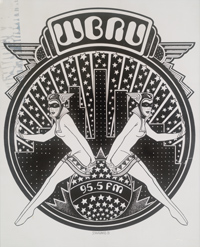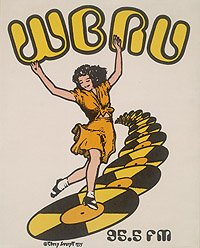1970 – 1990
"360" Controversy

Minorities played a marginal role in the first 35 years of radio at Brown. Inspired by pioneering programs in major cities, WBRU-FM's "360 Degree Black Experience in Sound" was the first radio show in Rhode Island programmed for and by minorities.
The program was modeled on the "Black Appeal" format launched in New York in the late 1960s, with WLIB's "The Total Black Experience in Sound." The show mixed avant-garde jazz, rhythm and blues, and soul, with political and social commentary.
In 1972, WBRU's "360 Degree Black Experience in Sound" began broadcasting progressive music and commentary on issues affecting African Americans. While BRU's rock deejays commented on the Vietnam War, 360 programmers gave voice to the Civil Rights Movement. In 1975, 360 deejays rallied support for the Brown University student walkout protesting the administration's poor efforts to increase minority enrollment.
In 1996, a media consultant said WBRU could improve its ratings by playing rock music seven, instead of six, days a week. BRU's Board of Directors voted to cancel 360. Students and community members responded with outrage. Within days, the 360 Degree Black Experience in Sound was back on the air, although it shied away from controversial discussions and shifted its focus to music.
Fading AM, Ambitious FM

By the 1970s, WBRU-AM was known for original music and entertainment programming. The 1980s Brain Bowl quiz show stood out for its free-form style. But as the FM market grew competitive, WBRU-AM became a low priority for staffers. Buildings renovated with steel and concrete made the weak AM signal virtually inaudible.
WBRU-FM built upon WBRU-AM's legacy of serious news reporting. WBRU became southern New England's election headquarters in 1972, and over 40 Brown students broadcast election updates from across Rhode Island for eight hours straight. Such experiences helped launch many WBRU alumni into professional radio and television.

In 1975, WBRU's investigative documentary, Brutality in the Children's Center, prompted federal intervention at the center, and earned the American Bar Association's prestigious Silver Gavel Award.
WBRU-FM's ambitions didn't end with news coverage. The station already owned one of the country's most powerful FM transmitters, but in 1971, WBRU upped its signal to 50,000 watts via Brown's Science Library tower, Rhode Island's highest point. Campus-wide interference — including interference with monkey brain-wave experiments — continued until WBRU returned to 20,000 watts.
